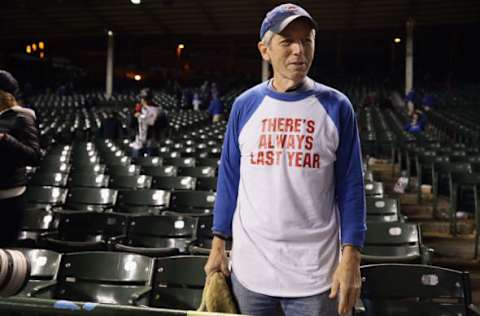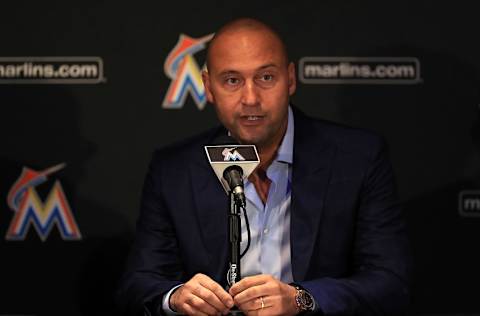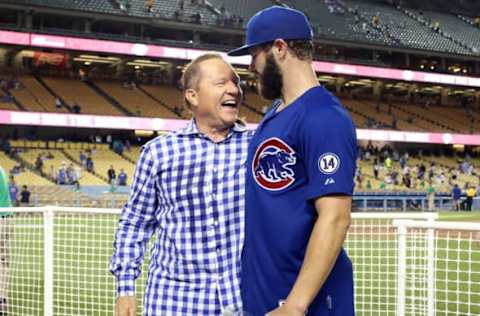Chicago Cubs: Is tanking and rebuilding bad for the game of baseball?


The Chicago Cubs perfectly executed the rebuild strategy running rampant in Major League Baseball. Tank in spectacular fashion – and rake in draft picks.
When Tom Ricketts purchased the Chicago Cubs and Theo Epstein came onboard to run the baseball operations department, we knew things would be different. As fans, we were told to expect a lengthy rebuild – but there would come a time where our beloved ‘Lovable Losers’ would be annual playoff contenders.
That time, of course, came in 2015 – a year earlier than most of us expected. But to reach that point, Chicago unloaded any veterans of value on a perennial basis come July. The sole focus was reloading a farm system that ranked near the bottom of almost every list when Epstein inherited control of the organization.
This tank-and-reload model worked to perfection. Chicago won its first World Series in 108 years and a century of disappointment washed away. One year later, the Houston Astros followed suit. Another year, another proof point for teams languishing near the bottom of the standings.
The latest teams seemingly set to embark upon this journey? The Miami Marlins have blown the model to pieces, trading seemingly every decent name on their roster in a draconian cost-cutting winter. The Pittsburgh Pirates are teetering on the brink, as well. With the Cubs ready to contend for the next four-to-five years and the Brewers making big-time moves, more trades could very well be on the horizon in the Steel City.

Tanking has thrown the brakes on free agency
And the fire sale in Miami? It’s completely changed the trajectory of free agency. With guys like Christian Yelich, Giancarlo Stanton and Marcel Ozuna all playing in new uniforms, the free agent demand took a big hit. Guys like J.D. Martinez are still looking for a home – despite putting up big-time numbers.
More from Cubbies Crib
- Cubs should keep close eye on non-tender candidate Cody Bellinger
- Cubs starting pitching has been thriving on the North Side
- Make no mistake: the Cubs are very much about power hitters
- Cubs are giving pitcher Javier Assad a deserved shot
- Cubs: It’s time to start thinking about potential September call-ups
And it’s not just position players. The biggest contract given to a free agent starting pitcher this year? The Cubs’ signing of right-hander Tyler Chatwood a couple months back – three years, $39 million. Jake Arrieta, Yu Darvish, Alex Cobb and Lance Lynn all remain unsigned.
Super-agent Scott Boras, whom I generally disagree with on principle, sat down with USA Today this week to talk about this offseason. If I had to wager a guess, it hasn’t been his favorite winter given the overwhelming majority of his guys still don’t have jobs.
“This tanking mechanism has dramatically interrupted the timing of the (free-agent) process,’’ said Boras. “You have clubs creating non-competitive behavior. Four All-Star players bursting into the market completely affected the normal ebb and flow of free agency.’’
He’s not wrong.
Remember when we thought Arrieta would land $100-plus million easily? Or Darvish would pocket a seven-year offer from someone? What about rumblings over a 10-year Eric Hosmer contract? Those days are long gone.

Fixing the draft
So, here it is. Scott Boras’ solution to fix baseball.
Boras has proposed draft bonuses for winning games. If a small-market team wins at least 78 games, it receives $2 million more to spend in the draft while the other teams get $1 million. It doubles if you win 80 games, with $2 million increments for every two victories, providing an extra $10 million in draft dollars to small-market clubs, and $5 million to large-market clubs, who win at least 86 games in a season.
It’s not an awful idea – by any stretch. Whether or not you agree with this exact solution is not the point here. The current configuration of the Major League draft is shredding the competitive nature of the sport. Now, I know what you’re going to say: this makes the most sense to regain long-term success for organizations.
Not necessarily.
Leadership is everything
Both Houston and Chicago struck it rich in Kris Bryant and Carlos Correa, respectively. And keep in mind, the Astros took Mark Appel with the top pick in 2013. The Cubs followed that by taking Bryant with the second overall selection. The rest, as they say is history.
Now, Jeff Luhnow got it right (clearly) with Correa. But what if they’d whiffed again? What if Chicago went after Jon Gray instead of Bryant? What I’m getting to is this: getting high draft picks does not necessarily equate to building a long-term winner.
The Cubs have been incredibly well-prepared when it comes to the June draft. And, to be honest, we have enjoyed the leadership and expertise of Theo Epstein and Jed Hoyer – growing accustomed to regular success, both in free agency and trades.
Not every team has such a reliable hand at the tiller.
Next: Cubs still hold advantage over Cardinals heading into '18
Baseball has to own this mistake. It’s time to encourage competition rather than burning it all to the ground and hoping for the best. Without a competent front office (or perhaps outstanding would be a better term), the tank-and-rebuild guarantees nothing.
Let’s reward teams for winning – not throwing away season after season.